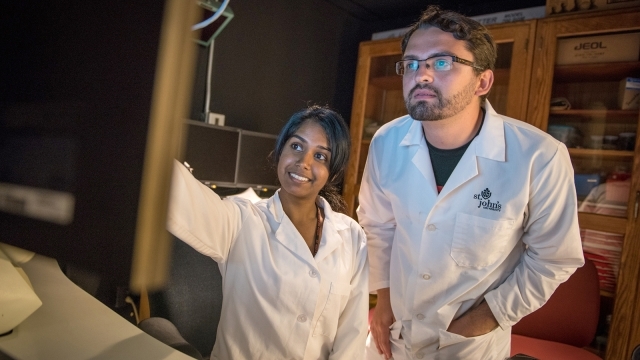

UG
Toxicology, Bachelor of Science
Our toxicology degree is a STEM program examining the effects of chemicals on human health and the environment.
- Home
- Academics
- Majors and Programs of Study
- Toxicology, Bachelor of Science
Toxicology is concerned with understanding the harmful effects of chemicals on human health and the environment. It is an interdisciplinary field that integrates biology, chemistry, medicine, and physiology to make a safer world.
St. John’s University is proud to have created the first toxicology bachelor’s degree with over 50 years of experience guiding students into successful professional occupations.
The St. John’s Toxicology program is a 4-year science degree that includes both the chemical and biological sciences as well as our specialty toxicology courses. Our program includes an automatic minor in chemistry and prepares students for leadership roles in toxicology, research, medicine, public health, pharmaceutical and chemical industries, and numerous other possibilities. In addition to foundational science knowledge, students acquire communication and analytical skills to enable them to use their toxicology expertise to promote the safety of all communities and the environment.
In addition to the bachelor’s degree at St. John’s, we have programs leading to post-graduate toxicology training, including BS/MS, MS, and Ph.D. degrees. There is a great need for toxicologists. Our graduates have launched careers in government agencies (CDC, FDA, EPA, health departments), cosmetic and pharmaceutical industries, as well as clinical, forensic, and environmental laboratories. The program is an excellent foundation for medical and dental schools and other health professions.
- Degree Type
- BS
- Area of Interest
- Nursing, Pharmacy & Health Sciences
- Associated Colleges or Schools
- Program Location
- Queens Campus
- Required Credit Hours
- 127
Careers in Toxicology
Risk Assessment - Industry
-Pharmaceuticals
-Chemical Companies
-Personal Care Products
-Cleaning Agents
-Building Materials
Risk Assessment- Government
-Local and federal environmental agencies (eg. EPA)
-Occupational Health
-Consumer Product Safety
-Food and Drug Administration
Toxicology Research
-Analytical (Environmental and Forensic)
-Quality Assurance
-Government agencies
-Academia
Department Contact
Dr. Ford is the Director of the Toxicology Program. She can answer questions about the curriculum, activities, and career opportunities.
Sue M. Ford, PhD, DABT
Program Director
St. Albert Hall, Room 305
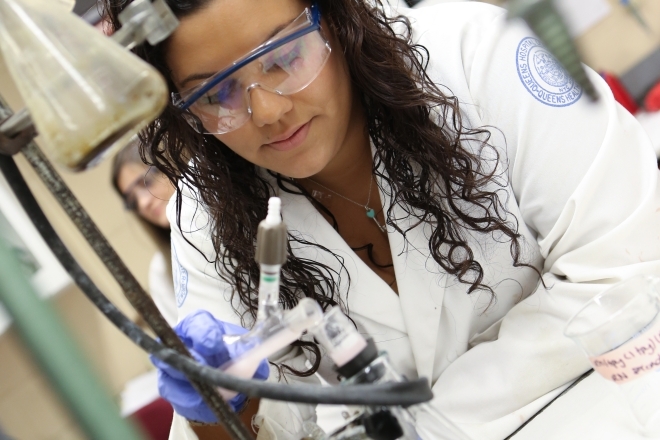
A STEM Program with a Difference
St. John’s Toxicology Program is an INTERDISCIPLINARY program in which students receive a solid background in the basic sciences (biology, chemistry, physics) and applied sciences (biochemistry, pharmacology, anatomy & physiology). In addition, students receive a comprehensive education in the field of TOXICOLOGY taught by expert faculty.
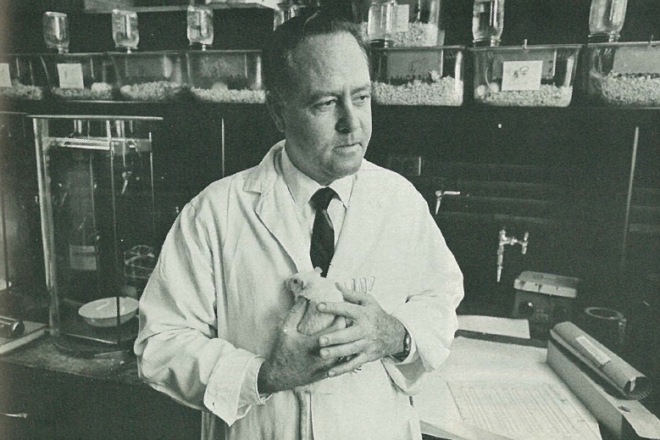
An Innovative Program
We were the first to offer this degree and have educated students for over 50 years.

More Than Just Lectures
Our students have many opportunities for extracurricular activities and professional development.
Featured Faculty
The scientists who teach toxicology at St. John’s are experts in the field. They are members of professional societies in toxicology with leadership roles.
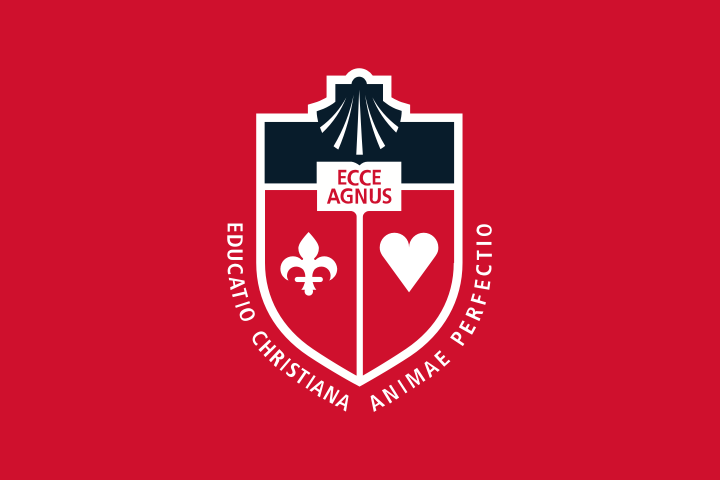





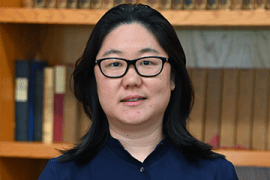
Curriculum
Year 1
Fall
| CRN | Course | Credits |
|---|---|---|
| ENG 1000C | English Composition | 3 |
| CHE 1210/11/12 | General Chem I/Lab/Rec | 5 |
| MTH 1250C | Statistical Applications for Pharmacy/Allied Health | 3 |
| HIS 1000C | Emergence of Global Society | 3 |
| DNY 1000C | Discover NY | 3 |
| Total | 17 |
Spring
| ENG 1100 C | Literature in a Global Context | 3 |
| MTH 1260C | Calculus Applications for Pharmacy/Allied Health | 3 |
| CHE 1220/21/22 | Gen Chem 2/Lab/Rec | 5 |
| BIO 2000 | Fundamentals of Biology | 3 |
| BIO 1211 | Fundamentals of Biology Lab | 1 |
| TOX 1101 | Perspectives in Toxcology | 1 |
| Total | 16 |
Year 2
Fall
| CHE 2230/31 | Organic Chemistry 1 & Lab | 5 |
| PHY 1610/11/12 | College Physics I/ Lab/Rec | 4 |
| PHS 3103 | Human Anatomy and Physiology I (Allied Health) | 3 |
| PHS 3104 | A&P lab | 1 |
| TOX 2403 | Current Issues in Toxicology | 3 |
| Total | 16 |
Spring
| CHE 2240/41 | Organic Chem 2 & Lab | 5 |
| PHY 1602/21/22 | Coll. Physics II/Lab/Rec | 4 |
| PHS 3105 | Human Anatomy and Physiology II (Allied Health) | 3 |
| PHI 1000C | Philosophy of the Human Person | 3 |
| THE 1000C | Perspectives on Christianity | 3 |
| Total | 18 |
Year 3
Fall
| THE 2xxx | Theology 2XXX | 3 |
| TOX 1401 | Molecular Toxicogenomics | 3 |
| TOX 1402 | Molecular Toxicogenomics Lab | 1 |
| TOX 3405 | Principles of Toxicology I | 4 |
| PHI 2200/2240 | Ethics or Medical Ethics | 3 |
| PHS 3101 | Pathology & Clinical Laboratory Data/ Allied Health | 3 |
| Total | 17 |
Spring
| PHS 2201 | Biopharmaceutical Chemistry | 4 |
| PHS 2301 | Biomedical Lab 1 | 1 |
| TOX 3406 | Principles of Toxicology II | 4 |
| PHS 3509 | Intro. Pharmacology | 2 |
| Soc Science | Psych, soc, or anthro | 3 |
| THE 3xxx | Theology 3000-level elective | 3 |
| Total | 17 |
Year 4
Fall
| TOX 4404 | Pharmacologic Toxicology | 4 |
| TOX 4405 | Pharmacotoxicology Lab & Lab Animal Certification | 1 |
| TOX 4413 | Analytical and Quantitative Toxicology | 3 |
| TOX 4414 | Analytical and Quantitative Toxicology LAB | 2 |
| LAC 1000C or language | Language and Culture or 2 semesters of a language | 3 |
| PHS 3951 | elective research | opt |
| graduate course/ other elective | opt | |
| 13-18 |
Spring
| TOX 4412 | Regulatory Toxicology & Risk Analysis | 4 |
| TOX 4403 | Toxicology Colloquium | 4 |
| Fine Arts/Music or Language 2 | Art/Music or 2 semesters of a language | 3 |
| PHIL 3000C | Metaphysics | 3 |
| PHS 3952 | elective research | opt |
| graduate course/ other elective | opt | |
| 14-18 |
Total Credits
128
Admission
For more information about admission to this and other acclaimed undergraduate programs at St. John’s University, please visit Undergraduate Admission online. Or contact us directly at the campus of your choice:
Admission Office - Queens Campus
718-990-2000
[email protected]
Interested in Nursing, Pharmacy & Health Sciences, but not sure if Toxicology, Bachelor of Science is right for you?
Related Programs
UG
70% of medical decisions depend on laboratory test results performed by clinical laboratory scientists. -CDC
- Queens Campus
GR
Prepare for the high demand for audiologists with a Doctor of Audiology degree from St. John's!
- Queens Campus
GR
Doctorate (Ph.D.) basic science research in Pharmaceutical Sciences specializing in one of Industrial Pharmacy, Medicinal Chemistry, Pharmacology or Toxicology
- Queens Campus
GR
Master’s level degree in Pharmaceutical Sciences specializing in one of Industrial Pharmacy, Medicinal Chemistry or Pharmacology with an optional basic research component.
- Queens Campus
UG
This program is a rigorous course of study, combining didactic and laboratory-based academic instruction with clinical training at leading New York-area hospitals, medical centers, and private medical practices.
- Queens Campus
GR
The Master of Arts program in Speech-Language Pathology is designed to provide the academic and clinical education that graduates need to meet the profession’s existing and emerging demands.
- Queens Campus
GR
Toxicology is the study of the adverse effects of chemical, physical or biological agents on people, animals and the environment with the goal of enhancing the overall safety and health of the public. The program prepares students for careers in research, academia, regulatory agencies and industry.
- Queens Campus
Take the Next Step

Explore Affordability
The Office of Student Financial Services is committed to providing students and their families with the information they need to navigate and understand the financial aid and payment process.
Apply to St. John's
St. John’s offers a free online application for all 100+ undergraduate programs, and graduate applications carry a low cost for most programs.
